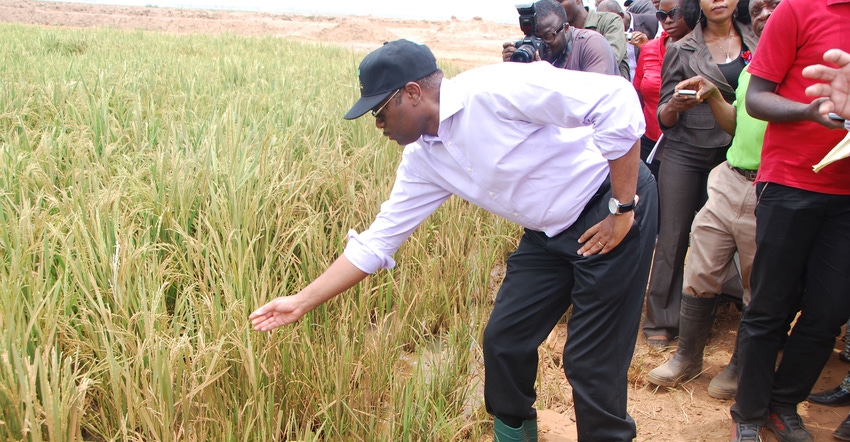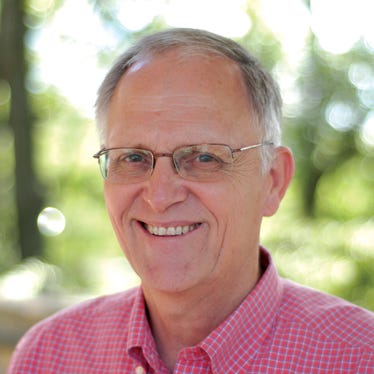October 31, 2017

Addressing the audience at the Iowa state capitol in Des Moines where he was presented the 2017 World Food Prize on Oct. 19, Akinwumi Adesina vowed to carry on his work fighting hunger in Africa. President of the African Development Bank, Adesina said he would use the $250,000 award that comes with the prize to provide fellowships and grants to young African farmers and agriculture entrepreneurs.
Adesina is a 57-year-old Nigerian who earned a doctorate in ag economics from Purdue University and returned to Africa to help improve food production there. At this year’s World Food Prize ceremony, he said, “We will arise and feed Africa. The day is coming soon when all its children will be well-fed, when millions of small-holder farmers will be able to send their kids to school. Then you will hear a new song across Africa: Thank God our lives are better at last.”
Adesina won the 2017 World Food Prize for his work in improving the availability of seed, fertilizer and financing for African farmers, and for laying the foundation for the next generation of farmers in Africa to engage in agriculture as a profitable business.
Known as ‘Norman Borlaug of Africa’
Accompanied by the former president of Nigeria and former president of Ghana, Adesina stepped to the podium to receive the award — the world’s highest recognition for food and agriculture — with his wife and two children and a large and distinguished crowd cheering him. He is known as “Africa’s Norman Borlaug.”
Borlaug, who died in 2009, was raised on a farm near Cresco in northeast Iowa. Borlaug earned a doctorate in plant pathology, worked in crop breeding in developing countries, won the Nobel Peace Prize in 1970 and founded the World Food Prize in 1986.
Borlaug is known as the “Father of the Green Revolution” for his work in developing high-yielding wheat varieties in the 1960s, preventing the starvation of millions of people in Mexico, India, Pakistan and other Third World countries. Borlaug believed a Green Revolution could also take place in Africa someday. During a conversation years ago, Adesina said Borlaug asked him if he played soccer. Adesina said yes. Borlaug responded, “You could score the first goal for Africa” in the fight against hunger on that continent. Borlaug inspired Adesina’s lifetime of work.
Africa must unlock its ag potential
Adesina, who spoke at a press conference ahead of the World Food Prize ceremony, stressed the need to put technology and information in the hands of farmers. “For me, the World Food Prize is a great honor and recognition for all the work I have done for decades. But it also puts wind behind our sail as we now take off to feed Africa. It is a job that has to be completed,” he said.
“Not only must Africa feed itself, it must feed itself with pride. Africa must also unlock the potentials of agriculture, turning its agriculture from something that’s used for managing poverty to something that is used for creating wealth.”
Adesina described the mobile phone as the most important tool in the hands of a farmer. “With it, they will find out information about markets, the weather and about access to finance,” he said. “People will be able to get other information, such as nutrition for mothers, for example. This access to information is very important. It is why when I was minister of agriculture in Nigeria, we launched the electronic wallet system that allows farmers to access fertilizers, and we reached over 15 million farmers.”
No farmer ‘wants to be poor’
The e-wallet system allows farmers to use electronic vouchers by mobile phone to buy seed and fertilizer directly, avoiding having to transact business through sometimes corrupt middlemen. The e-wallet system has helped raise production of crops and raised farmers’ income. The resulting rise in yields has led to improvement in food security for 40 million people in rural Nigeria. Under Adesina’s leadership, $5.6 billion in private-sector investment was attracted to his country.
Awareness and empowerment, he said, could only come through providing information and allowing farmers to access it. “I’ve never seen a farmer who wants to be poor,” Adesina said. He noted that he would “still be languishing in a Nigerian village” had his parents not sacrificed so he could attend school.
However, for Africa to become self-sufficient in food production, much more needs to be accomplished. Africa as a whole spends $35 billion annually on food imports, an amount that Adesina estimates will hit $110 billion by 2030.
Africa’s untapped arable land
“Africa has 65% of the uncultivated arable land left in the world today, so what Africa does with agriculture will determine the future of food in the world,” he emphasized. “African farmers need more than a helping hand. They need a policy lift.”
Adesina noted how the challenge of addressing global food security is greatest in Africa, where close to 300 million people are malnourished. It is the only region in the world where the proportion of the population that is food insecure has increased. He said that despite the progress globally in food production (including Africa, Latin America and Asia), the world still has 700 million people in extreme poverty. There are 800 million with chronic hunger, 2 billion people with micronutrient deficiency, and 150 million children under 5 years old suffering from stunting.
He described the challenge of feeding the world as immense, with the need for rapid increases in global food, feed and biofuel production to feed a global population of 9 billion by 2050. “If Dr. Borlaug could feed 1 billion people, we can feed 800 million people globally, and we definitely can feed 300 million Africans. Norman Borlaug would be disappointed if we couldn’t and with all the technologies and innovations, from gene revolution to the information and communication technology revolution at our disposal, we won’t be able to face him and say we didn’t.”
Africa needs investment in infrastructure
Africa needs money to be invested in electricity, roads and other infrastructure. Around 645 million Africans do not have access to electricity. The African Development Bank is investing $12 billion over five years and leveraging about $45 billion to $50 billion in private investment. “Africa cannot develop in the dark,” Adesina said. “Africa needs to industrialize fast to help add value to its farm products.”
The rich nations of the world today process and add value to everything they do, he said, while the poor nations export raw materials. “There is absolutely no reason for Africa to be a food-importing region. Africa has huge potential in agriculture, but as Dr. Borlaug used to say, ‘Nobody eats potential!’”
Africa holds the key for feeding the 9 billion people that are projected to inhabit the planet by 2050, says Adesina. He is calling for a land tax on unused and underused agricultural land in Africa, to provide incentives for faster commercialization of agriculture and unlock its production potential.
About the Author(s)
You May Also Like






